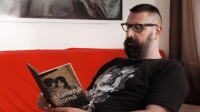Raphaël Cuomo and Maria Iorio
Maria Iorio and Raphaël Cuomo have been collaborating ever since they met during their studies at the Ecole Supérieure des Beaux Arts in Geneva. Video and photography are dominant in their work and usually combined in installation settings. The often extensive commitment to a project, however, often yields a variety of presentation formats, including books and edited collections of reference material. In 2006/07 Cuomo and Iorio were research fellows at Jan van Eyck Academy in Maastricht (NL). In 2007 and again in 2008 they were endowed with the Swiss Art Award. They live in Geneva and Berlin
Thursday, 27th September, 2012 - Cinema Arsenal
19.00
Twisted Realism Raphaël Cuomo, Maria Iorio, Switzerland 2010-12, 76', w/ Engl sbtls.
21.00 Carte Blanche
P.P.Pasolini: Cultura e societá Carlo di Carlo, Italien 1967, 20', w/ Engl sbtls.
La Ricotta Pier Paolo Pasolini, Italien 1963, 35', w/ German sbtls.
Appunti per un'orestiade africana Pier Paolo Pasolini, Italien 1969, 73', w/ German sbtls.
From Sep 1 to 28, 2012, Twisted Realism is presented at the gallery Savvy Contemporary (Berlin) in the exhibition "There is no wind in the moon". On Sep 27, the video will be screened at cinema Arsenal in the framework of "Der Standpunkt der Aufnahme - Point of View".
Twisted Realism is a body of interconnected works including a feature-length video, photographs, collected documents and vintage objects presented autonomously or in an architectural display. The project takes Pier Paolo Pasolini’s film Mamma Roma (1962) as a starting point to research the intertwined histories of urbanisation, migration and cinema in the period of reconstruction and “economic miracle” in Italy, an epoch marked by a re-organisation of capitalism, increasing consumption, and the emergence of new technologies of vision in the form of television.
The video revisits some shooting locations of Mamma Roma and embodies a new, singular geography of contemporary Rome and its historical peripheries. It investigates the urban development of the INA-Casa Tuscolano district, which served as location for Pasolini's film. This large-scale social housing project was realised in 1950-1960 in the framework of a national plan instigated by the demo-christian government. Twisted Realism includes archive material reviewed and filmed in Bologna (Cineteca Bologna, Centro Studi, Archivio Pier Paolo Pasolini) and in three film archives in Roma (Archivio del Movimento operaio, Archivio dello stato, Archivio storico Luce).Twisted Realism deconstructs the documentary and propagandistic logics of these films and emphasizes their contrasting “aesthetics of reality”.
A polyphony of voices recounts the scenario of Mamma Roma as well as different aspects of its production and diffusion, unfolding the historical context in which the film is inscribed. The Readers (including actor Giuseppe Cederna, scholar and queer activist WARBEAR, and filmmaker Carlo di Carlo, who was Pasolini’s assistant during the shooting of Mamma Roma) perform fragments of texts related to the film. Personal archive material and memories help to recall the situation on the set and the historical reception of the film – aspects that manifest political moments within the broader cinema agency and remind of the violent death of the young Marcello Elisei in a Roman prison, a fact that supposedly inspired the end of Mamma Roma.
Twisted Realism also points at the status of Pasolini's film at the moment of its transfer from film to digital culture: the recent restoration of Mamma Roma and its release within the DVD anthology Cinema Forever by Medusa Film (a sub-company of the Mediaset Group). It evokes how the Italian art cinema of the 1960s was commodified in a process of privatisation of culture and monopolisation of the mediascape, as well as how it was appropriated for writing a unifying version of the national history.
Carte Blanche
P.P.Pasolini: cultura e società (1967) is an affectionate portrait of Pasolini by Carlo di Carlo, who was his assistant director on Mamma Roma and who is also a protagonist of Twisted Realism. From the Arsenal archive two films by Pasolini - La Ricotta and Appunti per un'Orestiade Africana - are chosen to highlight both the depth and the limits of his work and to help discuss some of the references contained in Twisted Realism.
Back issue of "Der Standpunkt der Aufnahme - Point of View":
Wed, 17th November, 2010 - Cinema Arsenal
19.00
Sudeuropa, Raphaël Cuomo & Maria Iorio, Italy 2005-07, 40'
Orient Palace, Raphaël Cuomo & Maria Iorio, Tunisia 2008, excerpt 12'
Twisted Realism, Raphaël Cuomo & Maria Iorio, Italy/Switzerland 2010, excerpts c. 25'
21.00 Carte Blanche
Mamma Roma, Pier Paolo Pasolini, Italien 1962, 35 mm, OmE, 105’
In recent years, Cuomo and Iorio’s work has been focussing on the reciprocal relations between Southern Europe and Northern Africa and the political topic “illegal migration”. During a prolonged stay on the island of Lampedusa they produced the video Sudeuropa (2005-07), which deals with issues of visibility and the production of images catering to the European media consumer: the refugee “drama” and the Mediterranean holiday set.
From this work and the encounter with Maria Iorio’s and Raphaël Cuomo’s co-author Adbelhamid Boussofara grew a body of works still in progress, including "Orient Palace" (2008), "The Interpreter" (2009) and "Fabriques" (2010). The focus is on the manifold tansfers between Europe and Africa: the reciprocal migration; the unequal conditions of mobility for commodities, capital, and people; orientalist clichés and idealised notions of Europe and their respective adaptation in the tourist industry and in narratives of migration.
For the various productions of this ensemble that will form an articulated body, Maria Iorio, Raphaël Cuomo and Adbelhamid Boussofara are collaborating with other artists and authors who contribute work in a variety of formats. A common project which reflects on the relation between the co-authors is The Interpreter (2009), developed with geographer Makrem Mandhouj in Tunisia, and is based on elements of his ongoing research.





